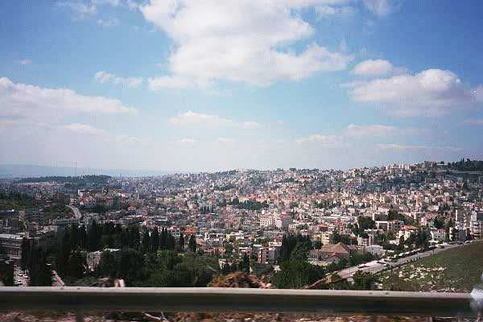Israel: Much-needed tax money funneled away from Arab towns
- By Fadi Eyadat Haartez May 2010.

- Photo Nazareth skyline, a historic city in Palestine.
For years government officials have been blaming economic distress in Arab towns on their local authorities’ shortcomings and failure to collect taxes. It has emerged, though, that Arab authorities receive only 0.2 percent of the taxes on government property on their land, while the majority of the money goes to Jewish local authorities, a civil rights group says.
In addition, the state has not built industrial areas and infrastructure facilities, which yield considerable taxes, in Arab communities. Other industrial areas were built on lands they say were confiscated from them, such as in Tziporit, Teradion and Afek.
“The government is practicing a deliberate policy of increasing the inequality between Jews and Arabs, conveying to the Arabs that they are not partners to the state’s assets,” said Ron Gerlitz, co-executive director of Sikkuy, the Association for the Advancement of Equality Opportunity.
“This has damaged the Arab population’s economic situation but also Israel’s economy. Without ignoring the Arab authorities’ administration problems, the government has not created income sources for the Arab community,” he says.
The Tziporit industrial area on Route 77, between the Arab villages Kafr Kana and Mashad and the Jewish village Hoshaya, was built in the early 1990s on land that belonged to the Emek Jezreel Valley regional council.
The area was allocated to distant Upper Nazareth, which collects hundreds of thousands of shekels in property taxes, ignoring the two adjacent Arab villages.
“The Arab villages are poor,” says Kafr Kana village committee chairman Bakir Awawde. “We also deserve assistance, especially since the land used to belong to Kafr Kana. Our unemployment rate is higher Upper Nazareth’s and we need a larger investment in education and infrastructures.”
Two weeks ago the Arab-Jewish committee of Kafr Kana, Mashad and Hoshaya received the Environmental Protection Ministry’s Green Globe Prize for its long campaign against the polluting aluminum plant IMC in Tziporit, leading to the plant’s closure.
“Kfar Kana residents get the pollution but not the financial income of this project, which could be invested in the village infrastructure and education,” Awawde said.
Further north, the Sakhnin municipality is demanding a “fair distribution” of the taxes from the Teradion industrial area adjacent to the city. The industrial area, on land taken from Sakhnin in the early 1980s, belongs to the Misgav regional council.
“Why not share the property taxes? It would strengthen regional cooperation and joint interests,” said Sakhnin spokesman Dr. Gazal Ria. “You can’t have the smoke and pollution harm Sakhnin, while the taxes go to Misgav.”
Sakhnin’s budget is some NIS 125 million while local property taxes yield a mere NIS 25 million – 90 percent of it from housing and 10 percent from businesses.
A tale of two cities
The state also deprives Arab towns of income from tourist attractions, commerce sites and government offices. For the past 30 years the Nazareth municipality has been struggling to get back about 100 dunams, known as the “Shprinzak compound,” an enclave in the city which was taken from the city in the 1970s for “security reasons” and “annexed” to Upper Nazareth.
Since then the Israel Defense Forces Northern Command headquarters have moved from the compound, which now houses the IDF Home Front Command and a hotel.
Nazareth could have increased its income by hundreds of thousands of shekels if it could carry out its plans to build tourist and commerce facilities as well as housing on that land.
On the border between Upper Nazareth and Nazereth, the state has built government ministries, courthouses and other public facilities. But instead of dividing the millions of shekels they pay in taxes between the two cities, the state gives all the taxes to Upper Nazereth.
The Industry, Trade and Labor Ministry said in response that the government encourages integrating authorities in Jewish and non-Jewish industrial areas.
The Interior Ministry said Nazareth has not asked to divide the government buildings’ taxes between the two cities.



I dont understand. why cant da jewish community help them outt to make peace??? ugh., pple deses days,
Commentaire par Elizabeth — 27 mai 2010 @ 18:27